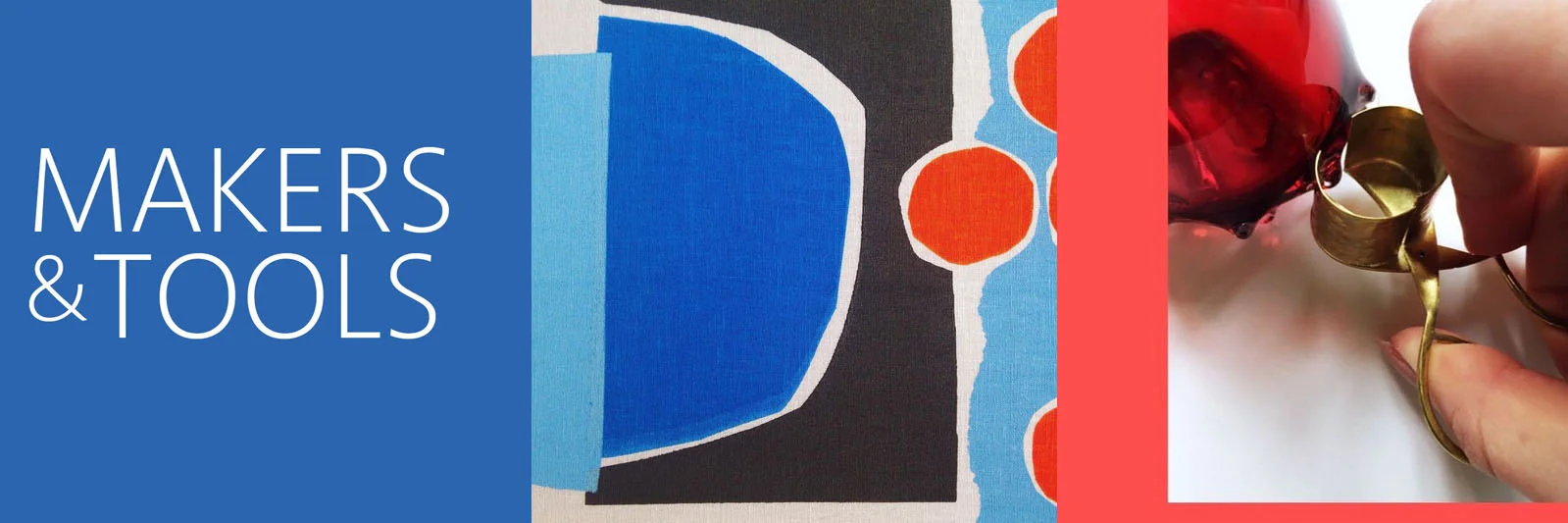The Makers & Tools project came about out of conversations with makers. Just before Christmas, I was asked by a magazine to interview contemporary craft makers about their relationships to their tools. I selected six emerging makers, working in different materials and with different approaches, whose work intrigued me. In one interview, the maker told me how at the start of the academic year, she and her fellow MA students were asked to bring in tools for a tool swap, a kind of ‘get to know you’ activity. I asked her if she knew what happened to the tool she gave away, whether the other student ended up using it; she didn’t know. And out of that small element of our conversation, the idea for Makers & Tools grew.
From my conversations with the makers, it was obvious how important tools are to craftspeople; how makers come to rely on specific tools that perform well, or do particular jobs. The tools are chosen to produce a certain effect or because they will help the maker achieve the result they want. Tools are aids. They are selected and utilised. I began to wonder, what if the position of tools in a maker’s practice were reversed – what if the tool came first? This notion, along with the idea of a tool swap, a collaborative process, led to the framework of the project: I wanted to see what would happen when the role of tools in a maker’s practice was disrupted. What happens if a maker doesn’t choose her tools? What if she is gifted a tool crafted by another maker? What effect does this benign intervention have on her making process, and what possibilities does this allow?
The project went through two stages. In the first, the makers were asked to create their own idea of a tool. How they chose to define a ‘tool’ was up to them. Once the tools were made, I asked each maker to send the tool on to another maker, and in this way the group was connected. The second stage of the project was for each maker to create an object in response to the tool they had been sent. They were free to interpret the tool in whatever way they felt appropriate, whether it was used practically to create, or conceptually to inspire, the new work. Nothing was fixed: no limits were placed on the work – they could use whichever materials they liked, in whatever way they wanted. Also, the objects did not have to be finished, finessed objects; a rarity for a craft maker.
Much of this project has been about letting go and allowing things to happen, both for me as the coordinator, and for the makers. I deliberately maintained a distance, not too involved in the makers’ process, instead offering quiet, open direction. I didn’t give the makers much information about each other, and they didn’t know who they were making tools for until the tools were made. This project is a collaborative effort but, unlike direct collaborations between artists involving conversation and being physically present, this one was a quiet dialogue, indirectly spoken through tools and objects. There is a communication between the makers’ work, and the influences of each other’s practices on the objects can be deciphered, but it is subtle. What has been exciting to hear, as I’ve gathered in the tools and the objects from the makers, is how this project has encouraged them to explore new processes or approaches without the fear of risk. The project sat alongside their professional making practice as a neutral space – this work does not have the pressure of being for a gallery, or being evaluated for a degree course, or needing to be sold. The project has offered an element of freedom which is difficult for makers to allow themselves.
The work in progress show at Hotel Elephant is the first time all the tools and objects have been brought together, and I am the only person, so far, who has seen the whole body of work – the makers have no idea what objects the others have made! There is a lovely sense of anticipation and I’m really looking forward to everyone meeting for the first time, the conversations that will come out of it. But most importantly, I’m interested in opening the conversation out to a wider audience – finding out how other people feel about the roles of tools to a maker’s practice and how they respond to the work we’ve created here.
Makers & Tools is an experimental project that aims to establish a method of prospective enquiry, fostering connections, and challenging the creative practice of contemporary craft makers.
Work in Progress show: 18 – 22 July 2017
Hotel Elephant Gallery, Spare Street, London SE17 3EP
